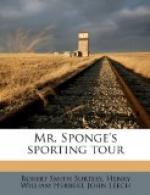Larkhall Hill stood in the centre of a circle, on a gentle eminence, commanding a view over a farm whose fertile fields and well-trimmed fences sufficiently indicated its boundaries, and looked indeed as if all the good of the country had come up to it. It was green and luxuriant even in winter, while the strong cane-coloured stubbles showed what a crop there had been. Turnips as big as cheeses swelled above the ground. In a little narrow dell, whose existence was more plainly indicated from the house by several healthy spindling larches shooting up from among the green gorse, was the cover—an almost certain find, with the almost equal certainty of a run from it. It occupied both sides of the sandy, rabbit-frequented dell, through which ran a sparkling stream, and it possessed the great advantage to foot-people of letting them see the fox found. Larkhall Hill was, therefore, a favourite both with horse and foot. So much good—at all events, so much well-farmed land would seem to justify a better or more imposing-looking house, the present one consisting, exclusive of the projecting garret ones in the Dutch tile roof, of the usual four windows and a door, that so well tell their own tale; passage in the middle, staircase in front, parlour on the right, best ditto on the left, with rooms to correspond above. To be sure, there was a great depth of house to the back; but this in no way contributed to the importance of the front, from which point alone the Springwheats chose to have it contemplated. If the back arrangements could have been divided, and added to the sides, they would have made two very good wings to the old red brick rose-entwined mansion. Having mentioned that its colour was red, it is almost superfluous to add that the door and rails were green.
This was a busy morning at Larkhall Hill. It was the first day of the season of my lord’s hounds meeting there, and the handsome Mrs. Springwheat had had as much trouble in overhauling the china and linen, and in dressing the children, preparatory to breakfast, as Springwheat had had in collecting knives and forks, and wine-glasses and tumblers for his department of the entertainment, to say nothing of looking after his new tops and cords. ‘The Hill,’ as the country people call it, was ‘full fig’; and a bright, balmy winter’s day softened the atmosphere, and felt as though a summer’s day had been shaken out of its place into winter. It is not often that the English climate is accommodating enough to lend its aid to set off a place to advantage.
Be that, however, as it may, things looked smiling both without and within. Mrs. Springwheat, by dint of early rising and superintendence, had got things into such a state of forwardness as to be able to adorn herself with a little jaunty cap—curious in microscopic punctures and cherry-coloured ribbon interlardments—placed so far back on her finely-shaped head as to proclaim beyond all possibility of cavil that it was there for ornament, and not for




